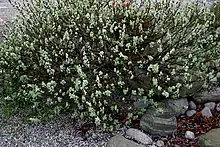Salix lanata
Salix lanata, the woolly willow, is a subarctic species of willow native to Iceland, the Faeroe Islands and Finland, through to eastern Siberia. In Scotland it can be found in only a few localities of Perthshire, Angus and Aberdeenshire, generally on rocky mountain sides at altitudes of 600–900 m (1,969–2,953 ft).[1]
| Salix lanata | |
|---|---|
 | |
| Scientific classification | |
| Kingdom: | Plantae |
| Clade: | Tracheophytes |
| Clade: | Angiosperms |
| Clade: | Eudicots |
| Clade: | Rosids |
| Order: | Malpighiales |
| Family: | Salicaceae |
| Genus: | Salix |
| Species: | S. lanata |
| Binomial name | |
| Salix lanata | |
Description
Salix lanata is a low, many-branched, deciduous shrub, generally less than 100 cm (39 in) high by 150 cm (59 in) broad. The new twigs are hairy at first, soon becoming hairless and brown. The grey-green leaves are rather variable, but generally ovate up to 7 cm (3 in) long by up to 6.5 cm (3 in) wide, covered in silvery-grey "wool" to begin with but less so with age. The leaf margins are usually entire.
The catkins appear in summer (May to July), with male and female catkins on separate plants (like all willows this species is dioecious). The female catkins are densely hairy. The petioles are usually less than 1 cm long, and the stipules usually 1 cm long by 0.6 cm wide, and persistent.[1][2][3]
The texture, colour and compact nature of this plant, together with its extreme hardiness, make it a valuable plant for cultivation. It has gained the Royal Horticultural Society's Award of Garden Merit.[4]
Gallery


 Upper surface of leaf, also showing stipules
Upper surface of leaf, also showing stipules Leaf petiole
Leaf petiole Lower surface of leaf
Lower surface of leaf Female catkin
Female catkin Salix lanata leaves
Salix lanata leaves
References
- Willows and Poplars of Great Britain and Ireland, BSBI Handbook No. 4; Meikle; 1984.
- New Flora of the British Isles; Clive Stace; Third edition; 2011 printing.
- RHS A-Z encyclopedia of garden plants. United Kingdom: Dorling Kindersley. 2008. p. 1136. ISBN 978-1405332965.
- "RHS Plant Selector - Salix lanata". Retrieved 17 February 2021.
External links
 Media related to Salix lanata at Wikimedia Commons
Media related to Salix lanata at Wikimedia Commons Data related to Salix lanata at Wikispecies
Data related to Salix lanata at Wikispecies- "Salix lanata". Plants for a Future.